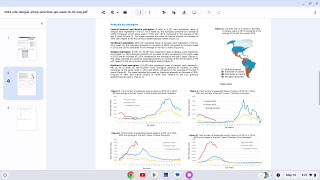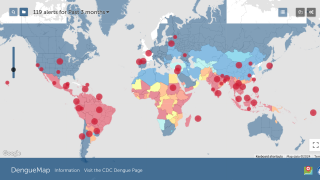Dengue Outbreaks Continue Disrupting the Americas

The US Centers for Disease Control and Prevention (CDC) announced the Dengue virus is an ongoing risk in many parts of Central and South America, Mexico, and the Caribbean.
The CDC’s new Level 1 Travel Alert issued on October 14, 2020, states ‘Travelers to areas of Dengue risk should protect themselves by preventing mosquito bites. In addition, the identified countries are reporting higher-than-usual numbers of dengue cases, and travelers visiting these countries may be at increased risk.
Dengue is a mosquito-borne viral infection that is common in warm, tropical climates. Infection is caused by any one of four closely related dengue viruses, which are called serotypes, which can lead to a wide spectrum of symptoms, including some that are mild, to those that may require medical intervention and hospitalization.
Dengue infection is acquired through the bite of certain species of mosquitoes, primarily Aedes aegypti, but also Aedes albopictus.
Dengue Outbreaks in Florida During 2020
While previously present in Florida, the Dengue virus was eliminated from the USA decades ago. Since then, a small number of Dengue cases have been reported each year in individuals with recent travel history to a dengue-endemic country.
Until 2009, there were no reports of dengue acquired in Florida since 1934.
In 2020, the Florida Department of Health (DOH) has reported 35 travel-associated cases. However, about 70 humans and seven mosquito pools have been reported from 2 counties in southern Florida.
Four cases of locally acquired dengue fever were reported in Miami-Dade and Monroe counties in the first week of October 2020. The Monroe County cases were identified through retrospective case finding efforts to better characterize activity early in the outbreak.
Controlling Dengue Outbreaks Through Mosquito Control
The CDC and the American Mosquito Control Association have collaborated to provide the first-ever comprehensive volume of resources to guide mosquito control in areas affected by natural disasters, such as hurricanes and flooding in this special edition of the Journal of the American Mosquito Control Association.
This guide found ‘hurricanes present several public health concerns, including a rapid surge in mosquito populations, which can disrupt recovery efforts and could lead to increased risk of mosquito-borne diseases.’
Effectively controlling mosquitoes after a natural disaster can help communities recover more quickly and avoid potential infectious disease outbreaks from endemic viruses
Dengue Vaccine Developments
There is an approved dengue vaccine available in various countries around the world, with several dengue vaccine candidates in clinical studies.
Dengvaxia (CYD-TDV) is a live attenuated tetravalent chimeric vaccine made using recombinant DNA technology by replacing the PrM (pre-membrane) and E (envelope) structural genes of yellow fever attenuated 17D strain vaccine with those from the four dengue serotypes.
Additional Dengue vaccine candidates can be found on this Vax-Before-Travel webpage.
Vax-Before-Travel publishes research-based travel news.
Our Trust Standards: Medical Advisory Committee

























